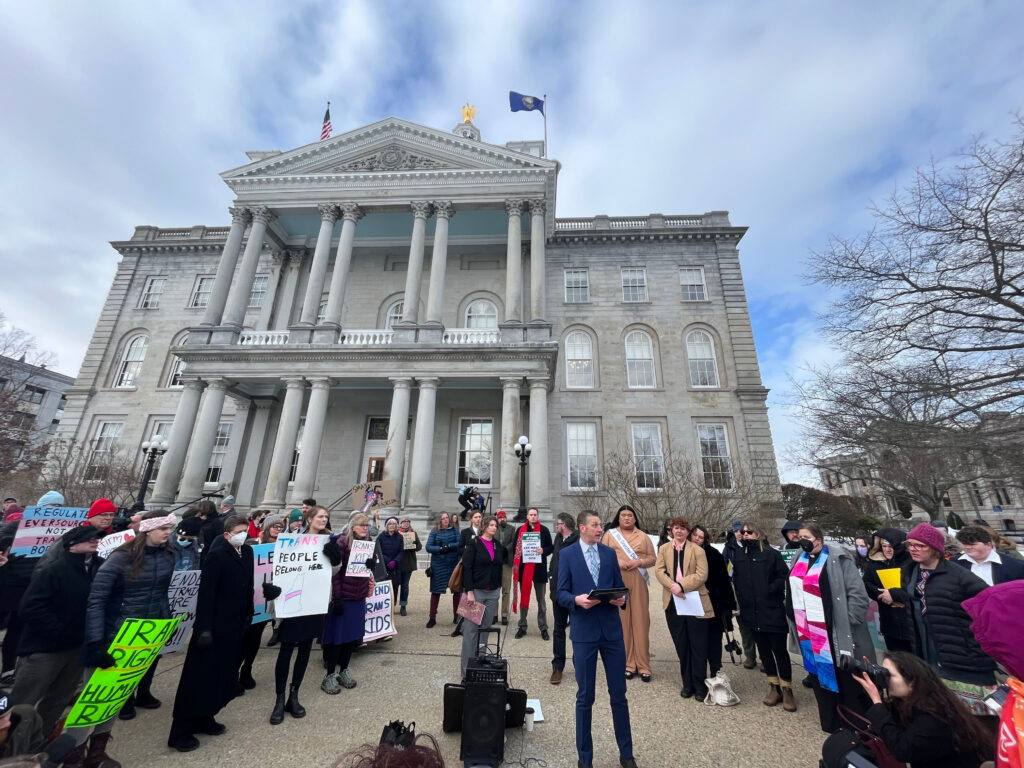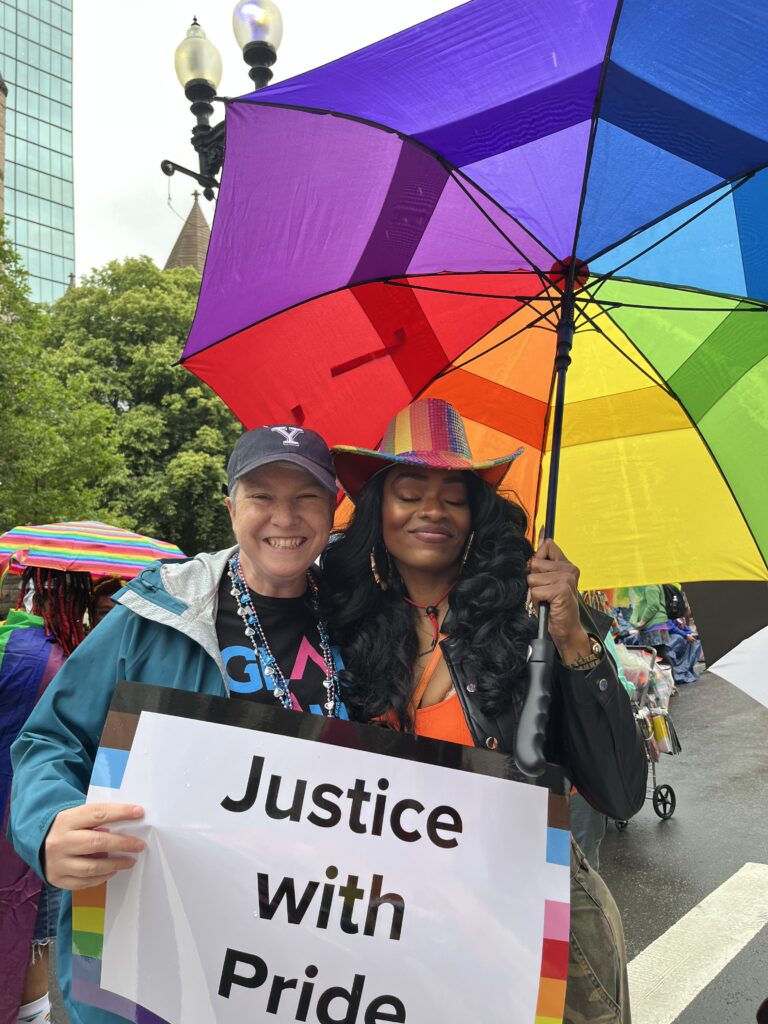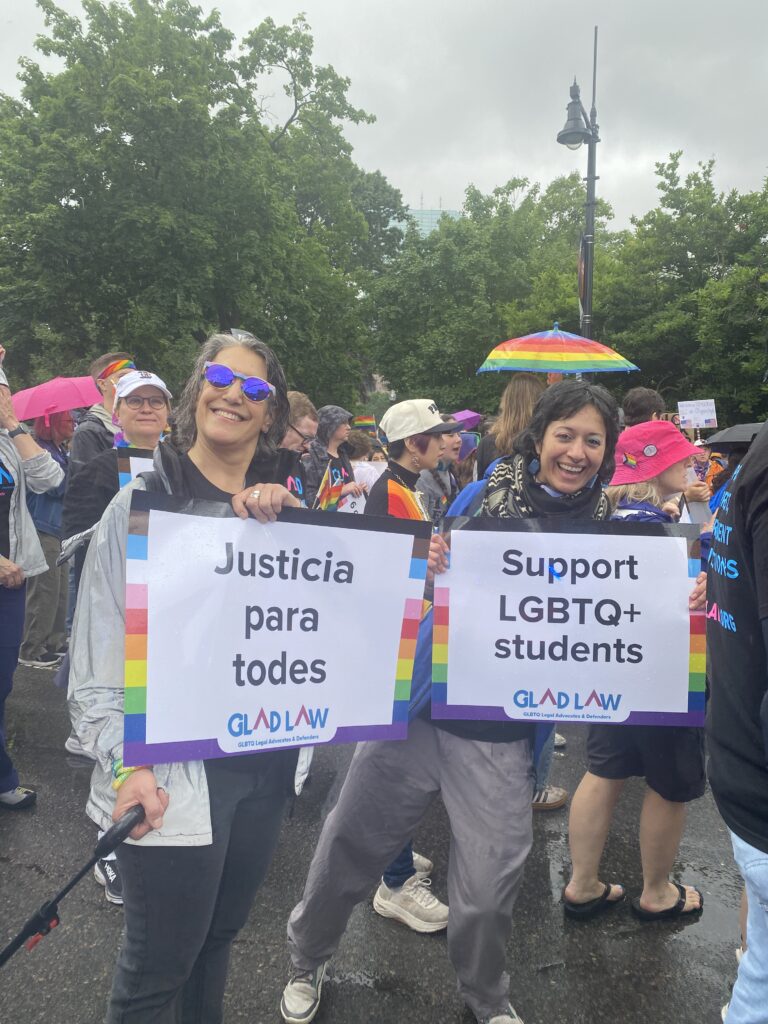Day One and Every Day Since: GLAD Law’s Relentless Defense of LGBTQ+ People
In the face of sweeping anti-LGBTQ+ executive orders, we took immediate legal action to stop, delay, and reduce harm.
Since taking office, President Trump has unleashed a barrage of executive orders targeting – among many others, immigrants, law firms, long-fought efforts to expand equality and inclusion, and LGBTQ+ people, particularly transgender members of our community. These policies immediately threatened safety, dignity, and equal treatment under the law, amounting to a full-scale attack on transgender people’s lives.
Within the first weeks of the new administration, the magnitude and speed of attacks heightened what had already been an emergency situation for LGBTQ+ people in many states. We took decisive action – GLAD Law filed multiple lawsuits in the first days of the Trump administration to protect as many of the people most impacted from immediate harm as possible.
Our Legal Challenges
An Executive Order Aimed at Making it Impossible for Transgender People to Live Their Lives
Executive Order 14168, signed on Day One, made it clear that transgender people would be among the administration’s primary targets. The order directed agencies across the government to operate as if transgender people don’t exist, removing vital federal protections and denying access to essential documents like accurate passports and visas.
One of the government’s first actions under the order was to demand the transfer of transgender women currently incarcerated in federal prisons, who were abruptly slated to be moved to men’s facilities and cut off from medically necessary health care. Transgender women face incredible brutality and increased risk of harassment and sexual assault when housed with men, something the government’s own data shows.
When calls from incarcerated transgender women and their loved ones came in, we knew we had to act quickly. We filed a trio of lawsuits challenging the dangerous policy changes that threatened these women’s safety, Moe v. Trump, Doe v. McHenry, and Jones v. Bondi. The courts ruled swiftly in each case to issue temporary restraining orders and then preliminary injunctions, so our plaintiffs all remain housed appropriately at women’s facilities and can access medical care, as litigation continues.
It’s no coincidence that the part of that Day One executive order directing the transfer of transgender women to men’s facilities – in violation of the data-backed individual placement assessment policy in place for well over a decade – was among the most concrete and quickly acted upon by the new administration. That brutality was a test of the public’s tolerance for how much cruelty can be carried out, and how far the government can push before resistance kicks in.
Prisons were only the beginning. This administration has used fear and disinformation to chip away at medical care for transgender youth, disappear immigrants to foreign prisons on fabricated pretenses with no opportunity to make their case in court, and label peaceful protestors as national security threats. The common thread is clear: dehumanizing and targeting the most marginalized to see what they can get away with.
When the government strips one group of due process, it’s not just a policy shift—it’s a trial balloon. If cruelty and undermining of the rule of law go unchecked, that is ceded ground that ultimately impacts all of us.
The promise of this country and our constitution is that everyone deserves humane treatment, due process, and equal protection under the law. It is up to all of us to ensure that this government—and any government—fails its bet on how much inhumanity the country is willing to ignore. Our democracy and humanity are at stake.
“Soaked in Animus”: The Administration Attempts to Purge Transgender Servicemembers
On January 27, the Trump administration issued an executive order banning transgender individuals from serving in the military. The sweeping order directed the swift removal of existing servicemembers regardless of skill, experience, or record. It also prohibited any transgender person from enlisting regardless of their ability to meet or even exceed the standards.
The order did not hide the administration’s hostility toward transgender people. In language a federal District Court judge in D.C. called “soaked in animus,” it brands transgender people as dishonest, selfish, undisciplined, and unfit. The bias behind the order became even clearer in the follow-up guidance from the Department of Defense, issued on February 26. The memo framed the policy as one grounded in maintaining “readiness, lethality, cohesion, honesty, humility, uniformity, and integrity”—and baselessly claimed that transgender people lack these qualities.
Having challenged Trump’s first transgender military ban in 2017, GLAD Law was ready. On the day after Trump issued his latest order to purge transgender servicemembers, GLAD Law and our partner National Center for LGBTQ Rights filed Talbott v. USA on behalf of multiple individuals who have honorably and courageously served their country and were facing imminent discharge under the ban.
On March 18, the D.C. District Court issued a nationwide preliminary injunction in Talbott halting enforcement of the ban, in a ruling finding it to be based in animus: “Its language is unabashedly demeaning, its policy stigmatizes transgender persons as inherently unfit, and its conclusions bear no relation to fact.” Noting that “thousands of transgender servicemembers have sacrificed—some risking their lives—to ensure for others the very equal protection rights the Military Ban seeks to deny them,” the court found that the ban discriminates based on transgender status and sex. Then, a federal Court in Washington State issued a second nationwide preliminary injunction against the ban in a case brought by our legal movement partners at Lambda Legal and Human Rights Campaign.
On May 6, the Supreme Court, in United States v. Shilling, granted the Trump administration’s April 24 motion for an emergency order allowing it to implement the ban while the case is being heard in the courts. The Court did not explain its decision.
“The Supreme Court’s decision to allow the military ban to go into effect is devastating for the thousands of qualified transgender servicemembers who have met the standards and are serving honorably, putting their lives on the line for their country every single day,” said Jennifer Levi on the day of the ruling. “Today’s decision only adds to the chaos and destruction caused by this administration. It’s not the end of the case, but the havoc it will wreak is devastating and irreparable. History will confirm the weight of the injustice done today.”
The transgender servicemembers we represent serve across all branches of the military and are contributing among the highest levels, including a Major, a Captain, a Sergeant, and a Navy Pilot. They bring decades of experience, training, and education, including a West Point education and several master’s degrees. They have decorated careers, with commendations ranging from Sailor of the Year and Meritorious Service Medals to Joint Service Commendations and a Bronze Star. Some have been a part of decorated military families spanning generations and have served honorably throughout the country and the world on many deployments.
“I am now a platoon leader for my military policing unit in the U.S. Army Reserve, and more than anything, I just want to continue to do the job that I have qualified for, trained for, and committed to in order to serve my country. The forced separation of dedicated, qualified servicemembers, the dismantling of careers, and the disrespect shown to families who have sacrificed so much is so counter to our military values. This ban disregards merit and achievement and unleashes unfathomable harms upon the lives, families, and careers of transgender servicemembers.”
Second Lieutenant Nicolas Talbott
It is a tremendous honor to represent courageous and dedicated transgender servicemembers, and we are determined to see this ban overturned for good. We endeavor to match the courage of our plaintiffs as we fight against the hostility of this administration in the courts.
Challenging Trump’s Ban on Transgender Girls in School Sports
In February, the administration issued an executive order threatening to pull funding from public schools if they do not ban transgender girls from participation in sports.
“The Trump administration’s executive orders amount to a coordinated campaign to prevent transgender people from functioning in society. The systematic targeting of transgender people across American institutions is chilling, but targeting young people in schools, denying them support and essential opportunities during their most vulnerable years, is especially cruel,” said Chris Erchull, Senior Staff Attorney, when we filed to expand our existing New Hampshire sports ban case to include a legal challenge to the federal order.
Our lawsuit, Tirrell and Turmell v. Edelblut, challenges HB 1205, a state law passed in 2024 banning all transgender girls in grades 5-12 from participating in school sports in New Hampshire public schools. Last September, the court ordered that our high school student plaintiffs Parker Tirrell and Iris Turmelle be allowed to play sports during the litigation, ruling that the state law discriminates against transgender students in violation of Title IX and the U.S. Constitution.
“I love playing soccer and we had a great season last fall. I just want to go to school like other kids and keep playing the game I love.”
Parker Tirrell
The federal ban, like the state law, singles out and discriminates against transgender girls and insinuates that they are not deserving of the same educational opportunities as all other students. Every child has a right to equal opportunities at school, and all students do better when they have access to resources that improve their mental, emotional, and physical health, including the opportunity to play sports with their friends. We’ll continue to defend every student’s right to learn, grow, and belong – at school and in all areas of life.
“I felt very upset that this has been happening towards a vulnerable community like the trans community, and frankly, it’s just unwarranted.”
Iris Turmell
Defending the Rule of Law
Perkins Coie v. US Department of Justice (District Court, DC)
In March, the law firm Perkins Coie filed a lawsuit challenging the legality of President Trump’s March 6 executive order, which targets the firm with broad reprisals for its association with certain clients and causes disfavored by the President. GLAD Law, with 22 other non-profit organizations and represented by a private firm, filed an amicus brief arguing that the executive order creates a chilling effect on non-profits from petitioning the government, limits their ability to access counsel, and is an affront to the rule of law.
On May 2, the D.C. District Court found President Trump’s executive order targeting Perkins Coie unconstitutional.
GLAD Law joined similar briefs in support of Wilmer Hale, Jenner & Block, and Susman Godfrey LLP, all of which were similarly targeted by the Trump administration.
The administration is working overtime in its attempts to intimidate those who dare to defend the Constitution. In fact, the administration recently took direct aim at our work, calling out GLAD Law by name in the case brought by Susman Godfrey LLP.
We won’t be intimidated. We have been preparing for government attacks and are ready for this fight. GLAD Law is committed to being on the front lines working to preserve democracy. While the government takes extraordinary measures against a respected law firm for exercising its First Amendment rights, we will keep doing what we’ve always done – using the proper legal channels to protect civil rights.
What’s at Stake
It’s not hyperbole to say that lives are on the line. Today, transgender people are being denied health care. Young people are being told—through sports bans, “don’t say gay or trans” policies in classrooms, and the censoring of books reflecting LGBTQ+ people’s experiences—that they don’t belong. Families are navigating fear and uncertainty.
GLAD Law is committed not just to respond to these attacks, but to lead. Over the last year, we’ve nearly doubled the size of our attorney team, and our supporters have generously stepped up in the face of escalating hostility across the country.
This is long-haul work. Cases will move through the courts, often slowly and not always smoothly, but we are not backing down. We’re not just defending against the most immediate threats—we’re building the legal scaffolding for a future in which LGBTQ+ people can live openly, safely, and freely. Every step forward is a step toward that future.
Timeline: GLAD Law’s Legal Response to Trump’s Anti-LGBTQ+ Executive Orders
January 20, 2025
Executive Order 14168 Issued
Targets transgender people across federal agencies: passports, prisons, shelters, government websites and forms, and more.
GLAD Law challenges filed January 26
January 27, 2025
Executive Order Bans Transgender Military Service
Trump bans transgender individuals from enlisting or continuing service.
GLAD Law challenge filed January 28
January 28, 2025
Executive Order Targets Health Care for Transgender Adolescents
Attempts to ban federal funding for youth medical care and remove coverage for federal employees’ transgender dependents.
February 5, 2025
Executive Order Bans Transgender Girls from Sports
Threatens schools with loss of federal funding for failing to exclude transgender girls from school sports.
GLAD Law lawsuit amended February 12 to include federal challenge
February 12, 2025
GLAD Law Wins Temporary Restraining Orders
In Moe v. Trump and Doe v. McHenry, courts block transfer of transgender women to men’s prisons and preserve medical care access.
Jones v. Trump filed same day.
March 18, 2025
Nationwide Preliminary Injunction in Talbott v. USA
Halts the military ban’s enforcement across the country.
March 26, 2025
Judge Rejects Trump’s Attempt to Overturn Injunction in Talbott
Ban remains halted. Legal protections remain in place while case proceeds.
March 27, 2025
Second Nationwide Injunction Issued
A separate court blocks enforcement of the transgender military ban (Shilling v. USA).
May 1, 2025
Talbott v. USA Plaintiffs Urge Supreme Court to Not Comply With Administration
32 transgender servicemembers and recruits filed friend-of-the-court brief urging the Court to leave multiple preliminary injunctions in place preventing implementation of President Trump’s transgender military ban.
May 6, 2025
Supreme Court Allows Ban to Go into Effect While Legal Cases Continue
US Supreme Court grants stay to the government in Shilling, in a 6-3 ruling, allowing the transgender military ban to go into effect while lawsuits proceed. We continue the work in the courts to fight for transgender service members, current and future, to serve their country with pride.
May 6 & 9, 2025
GLAD Law Files Briefs in Response to Secretary of Defense Hegseth’s Clear Animus
We filed two letter briefs with the US Court of Appeals for the DC Circuit after the Supreme Court ruling in Shilling. In our letters, we respond to the Court’s lack of engagement with Secretary Hegseth’s false claims regarding transgender service members, which show his clear animus for current and aspiring trans military personnel.











